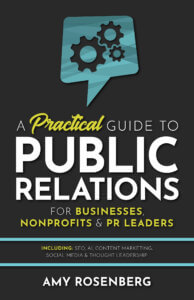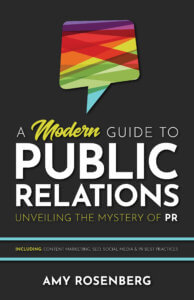- Be sure you have crucial elements included like a title, image, links, author bio and call-to-action. See Key Elements of a Blog Post.
- Practice makes perfect – or in my case, practice makes you better and writing easier.
- Quality over quantity – fewer good posts are better than lots of crap.
- Don’t write about yourself, but make it personal.
How To Come Up with Blog Post Ideas
On your own
Start with the products or services that you want to sell or expand the reach of. Are there specific products/service you need to promote? Make a list of them. It is the same process you go through when doing keyword research. I like to start manually, get general ideas and then spin from there.
Your Assets
Email – your inbox and outbox are great places to find ideas. You share info with customers, prospects and partners every day. Are there questions you are consistently answering? That’s a blog post idea (or 10). For example, I wrote an email about when to reply to HARO (Help A Reporter Out) requests after mentioning the tool in a presentation. Here’s a link to that email turned into a blog post.
Other Marketing Materials – your website (specifically your FAQ section and product/services pages), sales materials/brochures, even product manuals and internal training materials, are all great places to get inspiration for blog topics.
Customer Service Representative – talk to your frontline people, they know what your customers care about and what questions they have. They are also a great resource for social content.
Competitors & Collaborators – what are they talking about? You can take another angle on what competitors are writing about. Write about what/how you do it differently/better. Look at what your competitors are doing for inspiration and ideas (disclaimer: do not copy). We talk about looking at what the giants in your industry are doing (with a bad example of McDonald’s and the local burger joint participating in #BurgerWeek) or similar companies in another geographic area you don’t operate in. Be sure to always give credit.
Industry Newsletters – sign up for email newsletters that your industry releases. Set up a unique email or email folder rule for the newsletters so they don’t flood your inbox and you can go look at them when you are planning posts.
Pro Tip: don’t create the rule right away when you sign up for a new email newsletter, wait to see if the content is good for a few sends. If it is not, unsubscribe.
Site Search – what site visitors search for on your site gives you a great idea of what they want from you.
The World – pay attention to what’s going on in the world. Tie in with current events or news (carefully), look for national days or this day in history for inspiration.
Bonus thought not included in the podcast – see what is being discussed in industry forums (yes some still exist, but most have moved too…) and in LinkedIn and Facebook groups. What are people in and around your industry talking about? What problems are they having that you can solve?
+ With a group
Start with a brainstorm (with guidance), make sure your record the ideas (ideally audio or video as you won’t be able to keep up or get them all). Get a diverse group together. All kinds of stakeholders should be involved, not just marketing and sales folks. Even if they’d never write a post, they will have great ideas you may have never thought of. Make it fun.
- Ply them with pizza and beer.
- Get other input outside of you and your team.
Tools for Topics
There are all types of tools out there to help you through the process. Like with most things, Google is a good place to start:
Start with a regular old Google search. Once you start inputting your query, Google will begin to autofill, giving you ideas. In the podcast, we use my recent search for a new wrought iron railing as an example:

Related search – at the bottom of the SERP, Google provides additional suggestions:
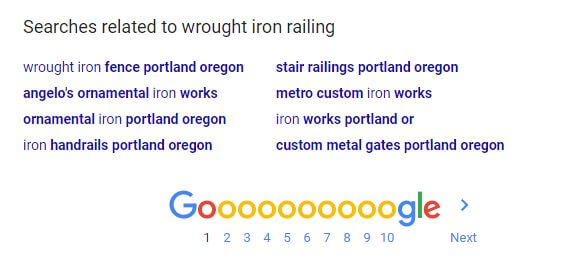
Google keyword planner tool +Moz Explorer
Moz’ Explorer tool is great as it gives you monthly search volume, difficulty, opportunity and suggested priority on a scale of 100.
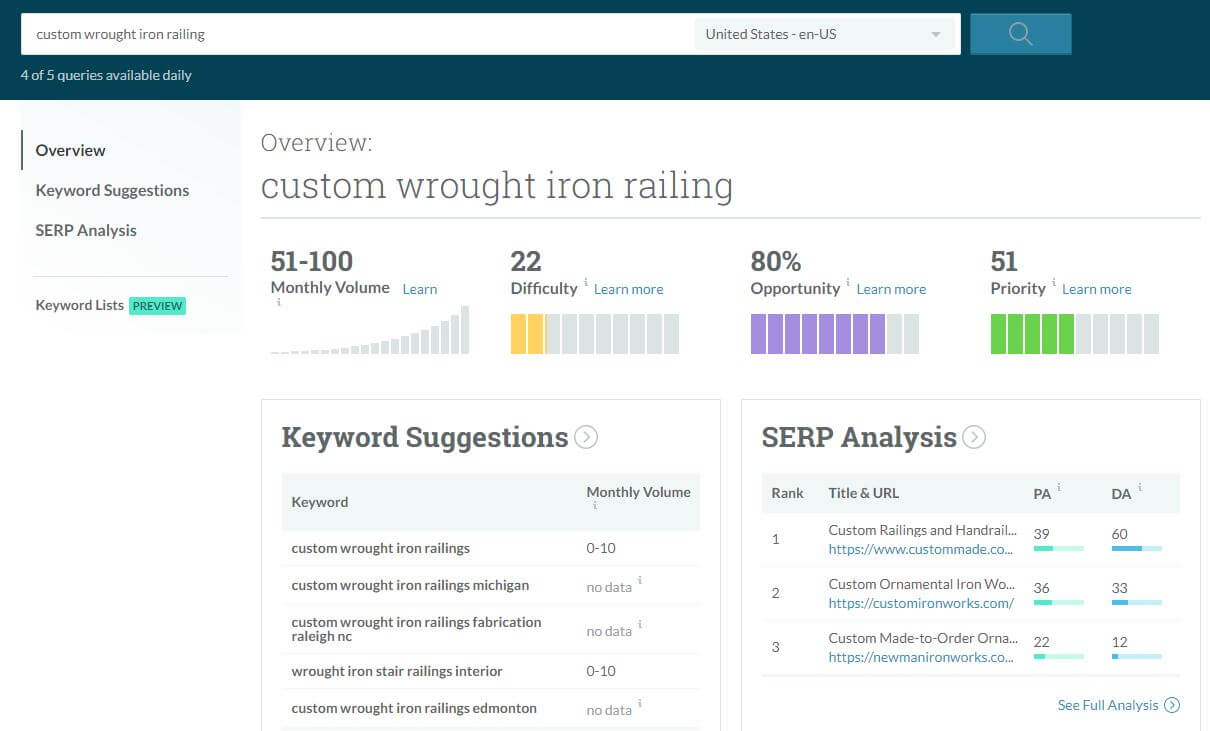
Google Trends + What’s Trending
We used the recent Shark Week “feat” of Michael Phelps racing a shark. Google Trends and What’s Trending will give you an idea of what’s popular now and historically. Finding an angle to tie-in your business to what is all the buzz can lead to good post ideas. A few years back, David Roth, who was at Realtor.com at the time, shared a post they did about NBA star Gilbert Arenas’ home that happened to have a shark tank in it to leverage the popularity of Shark Week.
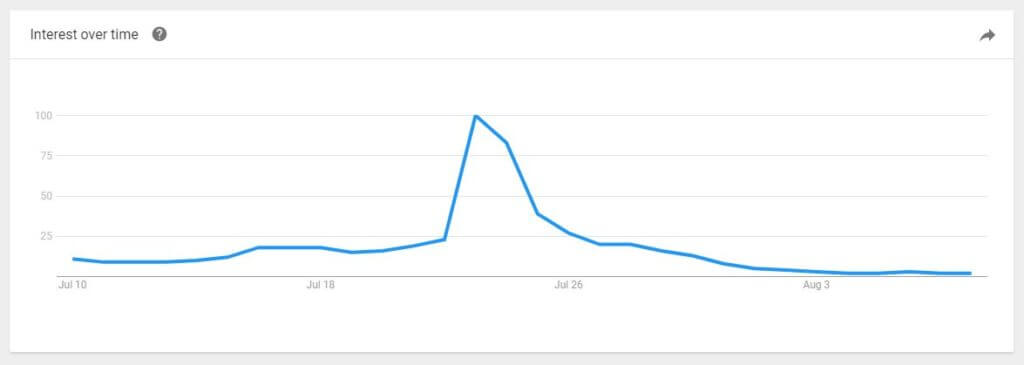
Search what to write about in your industry…
BuzzSumo
Provides social shares of posts on specific topics or keywords. Continuing with the Shark Week example we can see what the most popular posts are and where they are shared.
- Fans were legitimately upset that Michael Phelps didn’t race a real shark, USA Today:
- 20K Facebook shares (no LinkedIn shares, only 267 Twitter, so you can see what network specific types of content or topics are popular in)
- You can also see what articles &/or publications do well on specific social networks, e.g. a WSJ article has 903 LinkedIn shares
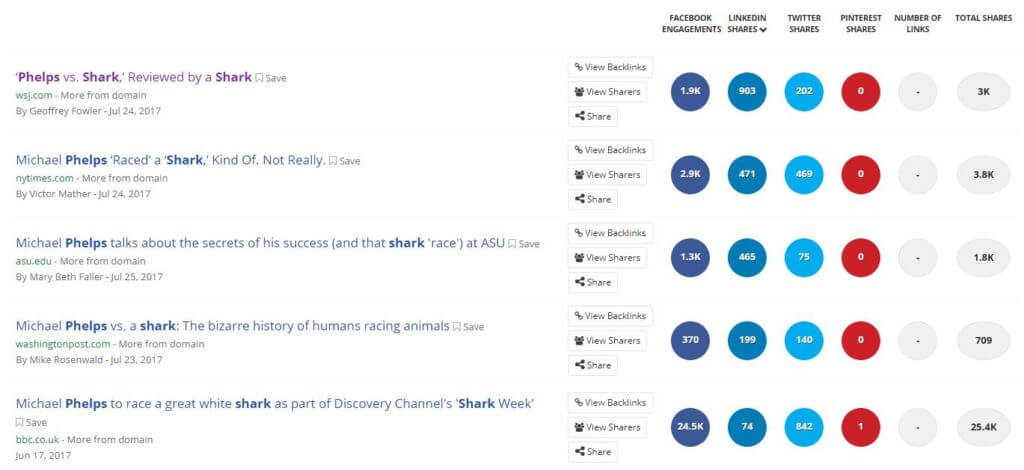
Quora
- Great place to ask and answer questions (maybe getting a bit saturated…)
- The last time I was on the site the top topic was “What’s your life typically like in Manhattan, New York if you’re single and make over $150k a year?” Maybe that is relevant to you, but not me.
Portent Content Idea Generator
There are also quite a few tools that you can input a few keywords and the tool will spit out blog topic ideas (or at least suggested topic titles) for you. To use Portent’s Content Idea Generator simply put in your topic and just keep refreshing. For this podcast we explored “business ethics” to see what the tool would come up with. There are plenty of good ideas:
- An Expert Interview About Business Ethics
- How business ethics are making the world a better place
And, of course, others that don’t quite hit:
- How Business Ethics Changed How We Think About Death
- 9 Ways Knowing About Business Ethics Will Land You in Jail (maybe this is a good one?!)
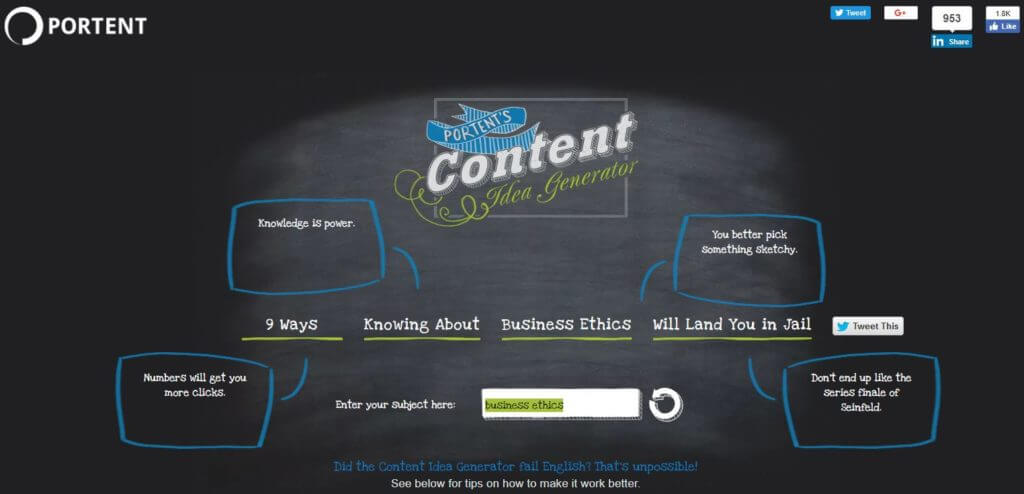
Hubspot Blog Topic Generator
Hubspot’s Blog Topic Generator asks for three nouns and gives you blog topic ideas. We used real estate, buyers, and sellers:
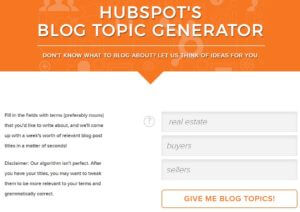 The Worst Advice We’ve Ever Heard About Real Estate
The Worst Advice We’ve Ever Heard About Real Estate
- Lots of potential for a collaborative piece with many real estate agents on this one.
- The History Of Buyers
- We could work with this…
- What Will Sellers Be Like In 100 Years?
- 15 Best Blogs To Follow About Real Estate
- The Ultimate Cheat Sheet On Buyers
A few others
- FAQ Fox (scrapes sites for their FAQs)
- Blog About – gives you a theme (e.g. “productivity”) and then lots of samples to help you along
Tools for Being Efficient
Pocket – save links for later, you can categorize/create folders, a great tool for social media planning too.
Alltop – provides top headlines from places like Entrepreneur, Fast Company, NYT and TechCrunch.
Dapulse – new project management tool we are excited to use, easily save and plan topics.
Summary
- Get organized – who will contribute and what’s your process?
- Quality over quantity (I mentioned Larry Kim’s SEMpdx presentation about killing donkeys and feeding unicorns)
- Lots of ways to get content ideas and you have access to most of them for free
- Ask for help
- Use tools to make it more efficient or at least get you going
- Remember the more you do something, the better you typically get at it. Including writing and coming up with ideas on what to write about
Featured image courtesy of Blake Wheeler
Expand to read the transcript?
Mike: Oh, good question. You know it’s kinda funny is, I remember when Amy started the blog and wrote the first post, and her first blog post was something like, “And the problem is Mike’s not a blogger.” And I was like, “Hey, wait a minute.” You know, I got this digital marketing background, I’ve been in digital for a long time, and then I thought about it and I’m think, “Yeah, you’re kinda right.” You know, of the, founders and principals of this company, Amy’s definitely more of the writer of the group. It’s like, “You write it, I’ll make it do well.” So it’s been awhile, I don’t even know what my first blog post was, but I’ve been blogging consistently now for a couple years.
Connor: Yeah. And how have you seen, at least with your style, how have you seen that evolve, just from the writing piece, to choosing a topic to, actually structuring it versus getting it online and everything?
Mike: Well, I think that, when I started I didn’t have any idea what I was doing. It’s just sort of thought, oh, what topic do I think I want to write about today and started writing about it with not really a lot of thought behind it. It would take forever. And, like, I kinda mentioned, I’m not naturally a great writer. And so, it would take a long time, there’d be a lot of edits, spending all kinds of time, maybe not even thinking about images and links and sources and stuff like that til you’re ready to actually publish it. So really just spending a lot more time than needed, and kinda going one at a time, and not being on a schedule, and kind of, “Oh, we’ll get to it when we can” kind of stuff.
Connor: And so that brings me to my question that sort of over-arches probably through this whole episode, but do you need to be a good writer to do well in blog posts? We’ve seen a lot of different stuff go viral, get picked up in a bunch of other syndicated websites that aren’t necessarily written very well but they seem to click for some reason.
Mike: Well, I think it’s kind of a loaded answer in that no, obviously, you don’t, right? There’s things that are written poorly that are not good content, but, and when I say, when you asked, “Do you have to be a good writer,” I don’t think anybody has to, I think that the stuff that I, not me personally not being a great writer, I think that by the time it gets published, it’s good, well it’s good enough. You know, maybe having somebody who is a good writer, or having somebody who is a good editor, always at least look at stuff is a good idea.
One of the points that I was thinking about this podcast is, I think having good content is better than having lots of crappy content. So, you don’t have to be an inherently good writer, I think that the more that you write, especially in blog format, the better you are.
Connor: Yeah, because there is a voice for it, right?
Mike: Yeah, and I also think it’s a different style to writing depending on who you are, right. I mean if you’re super formal, if you’re company is super formal, you know, for us, when we do media releases and things like that, we’re writing AP style, right? I think Amy kinda started on the blog writing AP style, and it’s, like, “Well, wait a minute, what voice are you trying to use?”
Connor: Let’s tone it back, let’s make it more approachable for everybody.
Mike: Totally, we won’t really talk about this much, because we are talking about how to come up with ideas, but it’s also the format that you write in, too. It’s gonna be totally different on a blog than it’s gonna be for a white paper, or an article that you’re writing for, a paper, or even online, for sure a book, or papers, you know, that sort of thing. So there’s certainly a shorter of attention span for blogs and places you kinda gotta chop it up a little bit.
Connor: Yeah. So I guess let’s dig into our, mechanics and processes for picking up new content to write. Walk me through some of that.
Mike: The first thing I wanted to talk about was even get further out to figuring out who’s gonna contribute and what that process looks like. We’re not gonna get too, too, into that, but I think you have to invest…you know, you asked me when I started blogging, why it took so long, what was that process like. I think because, if you’re not blogging, or if you’re already doing it the way you used to do it, I think you oughta take a step back and figure out what your process is a little bit better.
Connor: Okay, so, like what kind of processes?
Mike: First who’s going to write, write? Is it just you? Are you a one person small business owner or do you have a team? Are you going to have other people on your team writing for you? Do you have other employees who are gonna write for you? Do you have other partners who are gonna write for you? Do you work with an agency, are they gonna do something for you? Are you gonna use freelancers? If you start a blog and have any success people are going to start contacting you about writing for you, right. Some of those are great, some of those not so much.
Connor: Some of those you might pass on.
Mike: Yeah, exactly, so, you know, I think it’s better to get all those things in line before you really, I mean, you need to have those in line if you’re gonna put a plan together. So I think, figuring out, “Yes, what we’ll take guest posts, or no, we won’t, and if we will, how do we vet this to make sure that it’s not just somebody spamming, looking for, like, that sort of stuff.” And then if you’re using partners, how are you going to take those posts? You know, what I mean by that is, if you’re not the only one doing it, are you the who’s one posting it? Who’s posting it to the blog, and how are they getting those posts, and what are you requiring of people, right? So is it just, “Hey, email me your content.” Or is it, we want to put it in this Dropbox, or Google Drive folder or are we using like a base camp, or a dapulse, or, you know, what is it? Or are you just writing it in the blog, and then saving it as a draft, and whoever’s the publisher is gonna go read it and make sure it goes? So thinking about that sort of stuff ahead of time, making it easy, at least being consistent. And then, as you know, internally, we have a sheet that says, “Here’s all the different things that we want in a blog post.” Right, you gotta have a headline. We want that headline to be an H1, and we need to have an image, and that image needs to be either this size, ideally, or if it’s maybe too small, at least needs to be this aspect ratio, so that when they’re all on the blog page, they look right, and…
Interview: And look similar to one another?
Mike: Exactly. You know, are you requiring title tags and meta descriptions? Are you asking for excerpts, different things like that? I mean, as you know, we even go as far as making sure that they’re resizing images for social media. When you’re using a plugin like we do, that when you share a grab specifically for Facebook or LinkedIn, or whatever. So I think going into all those makes sense. And, when I write up the blog post on this podcast, we’ll put links in there that they…because we’ve, you know, we’ve…
Connor: We’ve outlined this…
Mike: We’ve outlined it before so it’s a nice little reference, but…
Connor: Yeah, just outlining in a different medium though.
Mike: Yeah. But, and then, I think the other thing is that we wanna talk about is we’re assuming that, at least we’re not talking today about things like, who your target market is and, you know, what the personas are that you’re going after. So, you know, coming up with blog post ideas, there’s work that goes in before, sort of, the brainstorm, or all these different tips that we’re gonna talk about. But you need to know that sort of stuff, and then…
Connor: And you wanna have that stuff patented down, ready to go, before you start coming up with ideas, right? Because if you’re just shooting blindly without any processes to back any of that content up, then what are you doing, right?
Mike: Exactly. Yeah, I mean, you’re sort of hoping that it hits. You know, maybe it’ll go viral.
Connor: Yeah, maybe, I mean, that’s the unpredictability of virality, it’s incredible.
Mike: So I think, the last thing, before we jump into it, something to think about, too, is what types of content. We’re specifically talking about blog posts idea, but you post, people post lots of things besides words and pictures on their blog. So, are you gonna do things like podcasts, you know? Tomorrow’s podcast has a blog post that goes along with it. You know, what other elements you want. Are you gonna do…are infographics interesting to your target market? What about video, you know? What type, if it’s written content, is it gonna be short posts, long posts, series of posts, you know, and I think that your own marketing materials we’ll talk about can also help feed into what you decide to have. But I think having a variety is good as well. And then, one last thing to kinda touch on is in general, unless you are in business, don’t write about yourself but make it personal.
Connor: What do you mean by that?
Mike: So what I mean is, like, use personal stories or anecdotes to get into what you’re talking about, have a voice. So when we were talking about more, like, figuring out who you are, and what you do, don’t make it…it’s not robotic, right. So, but to an extent, and again, if you are the brand, talking about you, and caring about you, people wanna know about who they’re reading, but maybe not what you had for breakfast.
Connor: Not their whole life story.
Mike: Yeah, you know, it’s sort of, like, social media started with pictures of hamburgers and everybody’s like, “What, okay, whatever.” Unless it’s a really, really, good burger.
Connor: It’s almost burger week come out in Portland, so maybe we’ll post some pictures.
Mike: That has not been on my radar.
Connor: Well, we’re gonna have to put that on our contact calendar, I guess.
Mike: Absolutely.
Connor: Yeah, so let’s dive in then. Give me some of the ways that you choose blog topics, internally at least. Let’s start there.
Mike: Yeah, when I think about it, there’s, I mean to kinda go through… What it’s like for you, if you’re doing it on your own, if you’re the person who’s in charge of it. And then, hopefully, there’s some team aspect to it, and you kinda add a couple tips for, you know, if you’re bringing in a team, but… So, I think the first thing to do is you start with, what it is you’re trying to accomplish. So are you selling something? You know, what are your products or services that, you know, we’re talking to businesses here, so, what is it, first of all, what do you have? Secondly, are there specific products or services that you want to sell more of or have further exposure for, and start by making a list of those, so pull your top products out, your general services. So come up with…it’s kinda like keyword research, right. So, you know, you’re saying okay, if you think, so if you, assuming you have a keyword list, start with your keyword list. Right, so I mean a lot of the point of blog is to help you with your SEO, to help get the word out there more about what you’re doing, and assuming that you’re going through picking keywords the right way, those are the type of terms that you expect people to be interested in around your business. So, you can start with those, and there’s some tools that we’ll talk about later, but you start with those and that’s a good base of, “Okay, so what are we gonna write about.” Right.
Connor: And have that purpose in mind, right, like, have an actual goal in your head, right. What is this blog post going to accomplish? Who am I going to get it in front of, and what are the means by which I’m gonna get it in front of those people, right?
Mike: And I think, you could, exactly, and you’re always coming back to, what is it that we’re talking about. And so that’s, to me, that’s the first step, and there’s, like I said, there’s some tools that we’ll talk about. That’s when you start plugging those keywords in to generate, or general ideas, and, you know, the thing about it is you just want general ideas, and then you, sort of, spin from there. Another way, so look at your keyword lists, if you don’t have them, do some keyword research. There’s all kinds of information out there about how to do keyword research.
One of my favorite places is email, so look in your email. Especially if you’re doing, like, if you have clients or customers and you’re interacting with them, what are they looking for? What are you providing to them? I remember, you asked about, you know, when we started doing this a few years ago, we were giving a presentation to a group about, you know, blending online and offline marketing, that sort of stuff, and one of the things that came up is there is a serve called HARO. Help a report out, right. And he was, like, “Yeah, I know about that, but I don’t really know, like, when I should answer.” And it’s kind of a long answer, right, so during the presentation, it wasn’t, like, “Okay, I’m gonna go into this.” And I gave him a brief answer then, but was like, “You know what, I’ll follow up with you and I’ll give you a really good answer.” And so I typed out this, you know, it’s on email, so it was probably a page-long answer to this, like, when you should answer and when you should answer hard questions. And I was like, “Wait a minute, this is a blog post.” So, I made it into a write-up.
So you’re doing this stuff every day all the time anyways, so just being able to identify, I mean, it’s probably, you have lots in your sent folder. You know, go back in there and make sure that you’re looking through there. Email’s a great place, other marketing materials, brochures. The things that sales brochures, looking at what, you’re conveying a message to somebody for a reason, right. So you can then look at all of those and come up with lots of blog post ideas based on those. And, of course, your website is another place where I like content, which is your brochure. And specifically in your content if you have a FAQ section, that’s a huge place. Like, every single FAQ could be at least one blog post probably.
Connor: Each question could be a title of a blog.
Mike: Exactly, right. And it’s interesting, and if you don’t have FAQs and you’re looking for them, there’s a site called, I think it’s faqfox or foxfaq, that actually goes out and scrapes, what industry you’re in, and it goes out and scrapes sites for their FAQs. So, you know, if you’re in real estate, you put in a few different real estate sites, it’ll go out there and give you ideas on what, not only what to write your FAQs for, but those are all blogs.
Connor: FAQ mining, what an industry.
Mike: Right. And then, yeah, if you, back to whether it’s via email, or social, or however you’re doing customer service, again, those questions that people are asking you, not only is that things that maybe go into your FAQ if they get asked a few times, but those are great pieces to go into blog content. And then another good place to look is, well, we talked about scraping your competitors’ FAQs, like, what are they posting about? Depending on how much you respect them, or maybe it’s not only competitors, but other folks who are in your industry or collaborators. You know, what are they talking about, especially what’s doing well, and we’ll talk about, how to see that a little bit when we talk about tools. What are they writing about? Channel partners, or other people that you’re partnered with makes a lot of sense, too. You know, so that you can talk about how you had success doing something with them. Or, the other thing about collaborators and partners is, not only do you write about what they’re saying, but you’re giving them credit. You’re talking about what they’re sharing, maybe you’re taking another angle on what they’ve written about that specifically applies to your audience.
Connor: That’s a good idea.
Mike: And, but give them credit, and link back to their post, you know, and let them know that you did it.
Connor: Maybe they’ll do it for you in the future too.
Mike: Exactly, exactly, and that’s one of the things about blogging and social networking is it’s social, right? Make sure they know.
Connor: It’s networking.
Mike: …and sharing, yeah, exactly, and you’re getting right in front of that partner again and, you know, lining to them and show them what’s good.
Connor: But then that competitor mirroring blog post type method that you were talking about, you wanna use that kinda sparingly, right? Because you don’t wanna make it look like you’re copying everything that they…
Mike: Absolutely, no, yeah, what I would say is more of, like, maybe you’re reading it and you do what they say differently, so then you’re writing about maybe the same topic, but you’re doing it on how you do it. Or, I mean, depending on what sort of environment you’re in, especially if it’s, like, the big competitor that maybe you don’t really even compete with, you know, off the top of my head, like, it’s McDonald’s, they’re…I don’t know if McDonald’s blogs, but, they’re writing about how great their hamburger is, right. In fact, our hamburger week winners, are they gonna be like, “Well, McDonald’s says their so great, but really, we are…”
Connor: We are the best.
Mike: So you can, I mean, you know, that’s, like, classic advertisement. When you’re comparing yourself especially, our local McDonald’s is up from the local burger joint, in fact, I’m sure it’s not, but, you know, you’re comparing yourself with the big player to put yourself on, on level ground, which is why you’re different. Maybe better, maybe just different.
Connor: Just different.
Mike: Yeah, make sure that it’s your own for sure. But it’s a good place to look, and see what they’re doing, you know. I think having a pulse on your competitors and other folks that, and they be more, like, frenemy-type competitors, right. I mean, there’s lots of folks that you’re in the same industry as that you’re not really super competitive at all, especially if you’re a local business, like, you look at what plumbers are doing in Alabama, and if you’re a plumber here, you can do, I mean it’s gonna be different, but you don’t, for sure, don’t be copying anything that anyone’s doing, but getting inspiration for ideas, it’s a great place to look.
Another great place is industry newsletters. I know I sign up for, we sign up for a ton of, whether it’s PR marketing industries or even the industries our clients are in, but those newsletters, I mean, they’re putting out content, whether it’s every day, or every week, or every month, I mean, it’s a great place to get ideas. I personally would say either set up an email specifically for it, or set up a folder in your email that you automatically have those go in because unless you wanna be sifting through these newsletters every day. But the other, sort of, pro tip that I would say is don’t do that right away. Like, when you subscribe to a new one, like, let it come in your inbox a little bit, so you can actually look at it. And then you’ll know, like, this is, this isn’t very good, I’m not gonna pay attention to it and then unsubscribe. And if it is good, then you can, you know, put the rule to put it in that folder, so that then when you’re ready to start planning, you can go back and see what people are doing. And, although, if it’s really, really, good, or if it’s really timely, like, for example, here in Portland, the “Portland Business Journal” news thing, I wouldn’t have those go into my newsletter folder, because there’s timely stuff in there, hopefully there’s client stuff in there. You wanna know about it right way, so if it’s more timely, you might not wanna have it filtered so you don’t look at it. Unless, like, if this is your job, job, then the only thing that you do, you’re probably in that folder all the time, so it’s okay, but that way, they can stack up pretty quickly. Several hundred.
Connor: Yeah, we know, we know that, yeah. So, blog posts and especially gathering from industry trends, competitors, anybody like that, you’re syndicate partners, blah, blah, blah, a lot of that stuff is coming in as timely news. So if you’re trying to schedule out blog posts, how do you work through that, like, when do you put it in your content calendar, how do you put it in your content calendar?
Mike: Well, that’s, I mean, with that sort of stuff, that’s a little bit harder. You know, some of the tools I’m gonna talk about is, like, Google Trends, and what’s trending, and so that’s gonna be current, right. So one thing is, depending on what your timeline is, you could be looking at future, right. So, you know, one of the things that I, Steve would actually look at the printed physical paper a couple times a week, is this day in history. And it’s, like, so that’s great social content, I mean, you can talk about that day, social media is easy to do on, sort of, a timely basis, do it that day. But writing a blog post about it is probably, at least for me, like, I’m not writing a blog post right now about a topic that I just read about. Some people can and maybe if you’re blogging every day, you’re gonna do that, but it’s still gonna be this day in history next year, and so, if it’s a good enough topic, you know, you can put it out there.
Connor: Schedule that out.
Mike: Yeah, and then you’re ahead of it and you’re, you know, it’s hitting at that time. So I think that that’s part of it. The other thing is a lot of things are cyclical, I mean, there’s also, like, national days, right. Those happen every year. You know those are in the future, we know when those are gonna happen. If you have a lot of free time or a researcher, you could do that, what happened on this date looking forward. Because, again, it already happened, so just because it’s not happening today, if it’s happening in a month, then you could…
Connor: Get something ready for that.
Mike: Yeah, so a lot of that is what’s going on. And then of coursemilestones in your company, and, you know, you’ll start pushing when you start coming up with ideas, they’ll get plugged into the calendar, and then as, you know, maybe things that actually do have a specific time, you gotta move that, and push things that way. So, I think that’s part of it is knowing that lots of things happen either on an annual basis or a frequency basis, it’s just a matter of doing research and getting in front of it as part of it.
Connor: Definitely. So you wanna run down some of those tools that you were talking about using?
Mike: Yeah, for sure. Well, actually, the one thing I want to make sure to say is, so this is, all of this stuff can be done by one person or multiple people, but we kinda talked about already. I really think that, especially if you’re either starting or reinvigorating this process, and ideally you get together your group, right. So whether it’s your employees, your stakeholders, or…we actually just, I’m on a board and we just did this for, of a non-profit where, actually, for the marketing committee, one of our meetings was, okay, let’s go through this process of saying here’s the seven core topics, within each of those core topic, there’s these sort of angles. You know, what other angles could we have, and let’s also get to the point where we just start throwing out ideas.
Connor: Yeah, just typical content ideas.
Mike: Totally, and, you know, make sure somebody is recording that, whether it’s write board, or white board, or on the computer, or even just videoing it, or audio, so you can go back to it, because, you know, when you get into the sessions, a lot of great ideas come up. And it’s not, don’t just have people who are blogging in there, too, right, so even if you are part of the big team.
Connor: anybody who is actually involved with the product you’re moving, or whatever, whatever you’re trying to convert.
Mike: And, this was actually for camp and not during this session, but during another time where we were talking to all of the staff, I mean, great ideas were coming out of, like, the chef, and the grounds crew, and, you know, the people who are in charge of programming, and all this stuff, and I mean, it’s amazing what people can come up with.
Connor: That sounds like a really good way to diversify the content, too, and not make it the same exact thing that you’re pushing down people’s throats every single blog post, right.
Mike: Yeah, exactly, and, you know, you never know. Then maybe you get those people to say “I’ll write about it, or I’ll at least do the draft on it,” so you say, “Let me call you and let’s just have a conversation, and I will record that, or take notes, and turn that into a blog post.” You know, so, it certainly helps get things going that way.
And then things like food, and drinks, and, you know, ply them with beer and pizza, maybe not right away, but, you know, the promise of it at the end.
Some of the tools, most things tool-wise, I tend to start with Google. Right, so the simplest way to start is do a search. Right, so you just, a simple search, just do it like auto fill. So, as you know, we start to search for something, Google is gonna start to suggest what they think you’re searching for.
Connor: Very presumptive of them.
Mike: Yes, it is. We were, I was actually recently, or, actually, still am, had to replace the, like, porch fencing in my house, right. Now, I want a wrought iron porch fence, and so I started searching for “wrought iron” and it’s, Google’s suggesting, “Are you asking for a fence? A railing? Gates? A bed?” So if I’m a, you know, a wrought iron manufacturer or custom, okay, so I’m gonna start, those are the things I’m going to start writing about, right. And then once you do that search, at the bottom of your search page, you’ve got related search, right. So it’s like, “Well, you searched for wrought iron, do you want custom? Do you want ornamental hand rails? Do you want gates?” You know, so, again that’s, this kinda goes back to maybe that keyword research, and maybe you’ve already done this, but the longer term, the longer tail you get, the longer that search term is, you’re gonna keep getting suggestions and you’ll just keep getting related search terms. So I think that’s a great place to start.
Google also has a keyword planner tool that you’ll probably get a lot of those too, and again, you can put your initial keywords in and it’ll give you tons of different ideas of, you know, different types of things to write about, especially around a keyword. And then Moz actually has a great explorer keyword tool as well. Where you can, it gives you even some more information, right. So as I put that, continue on that wrought iron example, you know, it’s giving me keywords like “wrought iron step railing,” “wrought iron porch railing,” and then it’s getting into, like, “What about cost, and design, you know, twisted wrought iron.” So, you know, why twisted wrought iron is better than flat, whatever they call the competitor, you know. But I would definitely recommend getting into the Moz explorer tool because it also gives you things like volume, and it’s on a scale of 1 to 100 it’s gonna rate that search term on, you know, are a lot of people searching that way? So if nobody’s searching that way, do you wanna write about it?
Mike: Maybe, maybe not. You know, it’s definitely not gonna be as high a priority probably.
Connor: But could be novel.
Mike: Exactly, and then it’s also gonna tell you difficulty, so how hard is it gonna be to rank well for that. So if there’s lots of people writing about it, it’s probably gonna be harder, you know, the types of folks to write about it, and then the opportunity that’s there, and then it’ll give you priority, so, I mean, you could really get into it or you could just kinda use it for suggestions. We already mentioned Google Trend and what’s trending. I actually went into that recently and it was all about Shark Week, like, she wanted to talk to Shark Week. So, you’re saying, like, well, Shark Week already happened, like, Phelps already raced the shark.
Connor: That was a great, great, race.
Mike: Yeah, but next year Shark Week’s gonna happen again, right, so, and if you’re, you know, really paying attention to it and if you’re in the shark industry, or whatever, you know, but you don’t have to be in the shark industry. In fact, this reminded me of several years ago, at a conference they were talking about content and ideas, and that’s where one of the, it was a realtor company, I think it was realtor.com was talking about how Gilbert Arenas, they were doing like…another thing is if you have celebrity tie-ins, that’s always good for content, but he was selling his home and it had a shark tank in it. And so they used that Gilbert Arenas has a shark tank in his home during Shark Week to write a piece of content that did well. You know, so there’s, you can get in there and look, and search your industry, too, to see what’s going on. Another really popular one is BuzzSumo. Are you familiar with Buzzsumo?
Connor: I’m not.
Mike: So it’s basically gonna tell you, like, what’s doing really well. Okay, what blog posts, what content, is doing really well on social right now. So you can go in there and look and see, okay, well what’s doing well around my topic, my industry that I’m looking for and get an idea what type of topics that…again, you can look in there and see topics that maybe you want to emulate, or take a different twist on them, but it’s gonna tell you things, like how many shares I’ve had on Facebook and LinkedIn. So, again I just checked, where there’s specific ones where fans were legitimately upset that Michael Phelps didn’t race a real shark.
Connor: Legitimately upset, they didn’t say that one coming.
Mike: They thought he was actually gonna…
Connor: The CGI shark fooled everybody.
Mike: Right, but interestingly, so looking at that, that was a “USA Today” article, and it got 20,000 Facebook shares, but it didn’t get any shares on LinkedIn. So…
Connor: Not deemed business worthy.
Mike: Exactly, however, there was one, there was a “Wall Street Journal” article about the shark and, like, I think it was the voice of the shark. I don’t know if you saw that one, but somebody wrote a letter about the voice of the shark, by the voice of the shark, or something in the “Wall Street Journal” and that one did really well, it had almost 1,000 LinkedIn shares. So, you know, thinking about who your target market is and what your social channel is that you wanna be in, doing this, going into BuzzSumo will give you a good idea there, and tons of different ideas.
Connor: That sounds like a great tool.
Mike: Another, sort of, looking for ideas tool that’s good is Quora. They have question and answer, you know, is a great place to get in there, especially on business topics to ask questions on. It seems like it’s maybe getting a little overused in the space.
Connor: A little saturated, yeah.
Mike: I mean, there’s lots of ideas in there. When I…
Connor: You just have to do a little extra hunting?
Mike: Yeah, exactly, you know, you’re gonna get things like, “What’s your lifestyle typically like in Manhattan, New York, if you’re single and make over $150,000 a year.”
Connor: Does not apply. Does not apply.
Mike: So it’s, like, Oh, but that was the most popular on their homepage today.
Connor: But good for that one person.
Mike: So those are general ideas, once you have those, there’s a couple of good tools out there to actually give you, maybe not your specific blog topic, but ones that are getting a lot closer. Portent has a content idea generator, which is cool. Like, you’ll put your search term in there and it’s gonna give you, when you hit it, and it’s gonna give you blog post ideas. So, when I was messing around with it in preparing for this, I put in “business ethics.” So let’s say your company is big on business ethics, or you just decide you wanna write a blog post on business ethics, but you don’t know what to write about, right. So putting that in there, one suggestion is, ” An expert interview about business ethics.” Hit refresh. “How business ethics are making the world a better place.” Hit refresh. “How business ethics changed how we think about death.”
Connor: Interesting.
Mike: There’s gonna be a lot of irrelevant ones that don’t make sense, but, you know, again, it’s an idea generation thing. Hubspot’s got another tool like that, too. You know, going in there, you know, you put in, actually there’s is cool, you put in three nouns, and it’ll give you five ideas. And then, again, you can refresh, or change your nouns, or that sort of stuff.
Connor: I used to make band names with a tool similar to that.
Mike: There you go.
Connor: It worked really well.
Mike: Exactly, you know.
Connor: Pineapple Briefcase.
Mike: Who knew. How could we make that into a blog post?
Connor: Yeah, we can do it.
Mike: I like it.
Connor: I think we can do it.
Mike: So what, you know, and, I mean, just to kinda give an example, and I think, again, go to the blog post on it, but, you know, if I’m thinking of the real estate world in that Hubspot line, it’s real estate, buyers and sellers, right. You’ve got their ideas, “the worst advice ever heard about real estate.” Okay, that could be interesting maybe. Yeah, that could be a series, right?
Connor: That’s pretty general.
Mike: Yeah, I mean, and those are where you’re talking about what type of blogs you’re gonna write. You know, that could be, you’ve got a bunch of brokers, like, “Hey, give me your, like, give me your two sentences on this.” And you’re putting together all the layering, realtors, yeah.
Mike: If you put all the links in there, and all of you share it and it’ll be amazing.
Connor: Yep, so that’s a unicorn, right?
Mike: Yeah, right. And then, finally, sort of the, you know, so you’ve got the coming up with what to write about, in general, maybe some specific topic ideas. And, again, you can kinda do this ahead of time, and then if you’re gonna do a group setting, that would set people…I mean, if you’re gonna go to a bunch of realtors and that worst advice I’ve ever heard. I mean, I’m sure you could have a great brainstorm for hours on that, it would go along all kinds of different lines, a great content ideas. But then the other thing is like, okay, you have all these ideas, how can you be efficient? You know, when you’re just, one of the other things is just when you’re out there, you know, I use the wrought iron example. You know, that was just me, happened to be searching, and maybe while I’m doing that I see some things that are applicable to my business, well save those. You know, a tool that we like to use is called Pocket, it just, you use it to save links and you can put them in folders and label them. So, one of your links is maybe blog content ideas, just save it in there, so when you’re ready to spend time thinking about and planning your blog, you can go back to it without having to go do more search stuff. So that’s a pretty good one.
Alltop is, basically, just gets headlines from lots of different leading industry, leading publications like “Entrepreneur,” and “Fast Company,” and “The New York Times,” it just kinda puts it, so you don’t have to go to each one individually, you can see, sort of, the top topics are for the day, and, you know, maybe again that’s one that’s super relevant for social when you’re being really timely, but it can also give you a good idea of what’s going on.
Dapulse, which is a project management tool that, actually, we’re really excited because they’ve come on to sponsor this podcast. We haven’t gotten in to actually using it yet, but it’s a project management tool, you know, it’s similar to Trello, where you can put things in a list and save them for later, so, we’ll have more on that in the future about how great it is.
Connor: Yes, stay tuned.
Mike: I’m sure, but we’re excited about getting in there and using that.
Connor: Great, well, so any last thoughts to wrap it up, or any key points to restate?
Mike: Yeah, no, I think that, you know, just kinda to summarize it saying, “Get organized.” Quality over quantity for sure. You know, quantity is good, if you can create lots of good content, that’s even better. Although that reminds me of the presentation you and I went to that Larry Kim did with killing donkeys and feeding unicorns. You know, that of course, that’s a whole other topic, but, you know, the things that are doing well. If they’re doing well, emulate them and do spin-offs and, you know, if you have content that you do that nobody likes, that’s okay, just let it go. Let it go.
Connor: You need to take the blue pill before you see that presentation.
Mike: Right, that’s true. There’s a lot, you know, quality over quantity, there’s a lot of ways to get content ideas. You have access to them, most of them for free. And a lot of the tools, all the tools I talked about have at least a free version that will get you going, for sure. Ask for help from people, different points of views are always really good. And then, kinda what we started with, like, the more you do something, the better you get at it. So, just practice and do it and, you know, as you come up with ideas, ideas lead to ideas. And you’ll be blogging like a pro like me, in no time.
Connor: Yes, exactly. All right, well, sounds good. I’m gonna go write a blog, but thanks for sharing all of your advice about this.
This episode of PR Talk is brought to you by PRSA Oregon
Throughout Oregon and Southwest Washington, PRSA provides members with networking, mentorship, skill building and professional development opportunities – whether you are a new professional fresh out of college or a skilled expert with 20 years in the industry. Check out PRSAoregon.org for more information on how membership can help you grow and connect.







